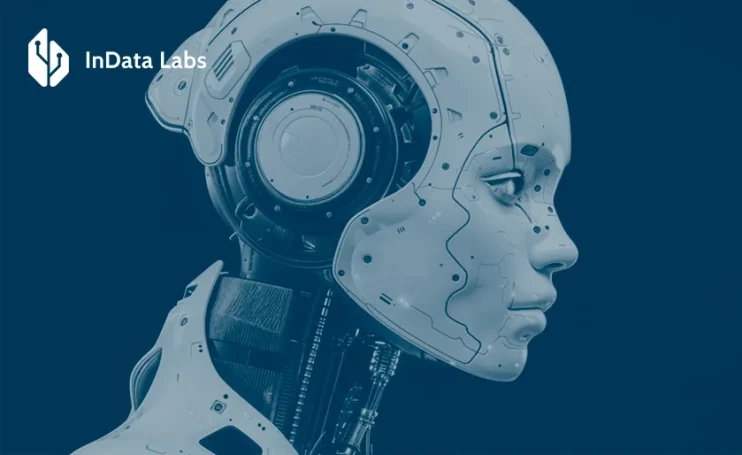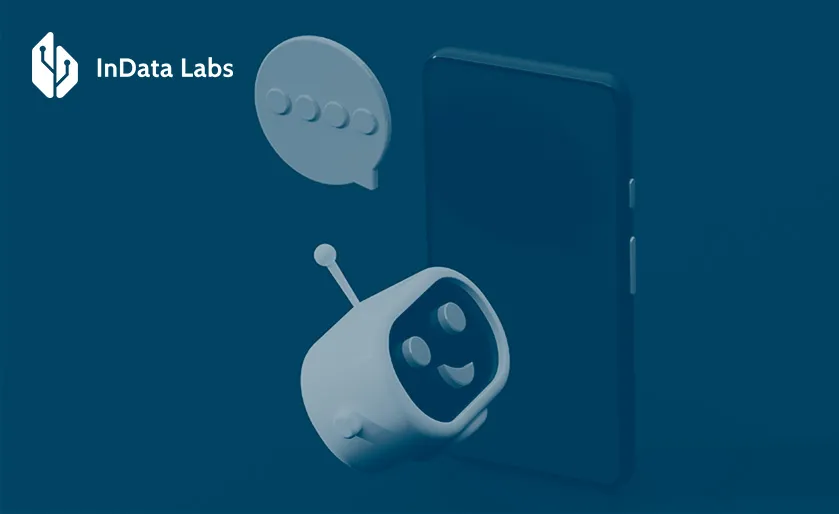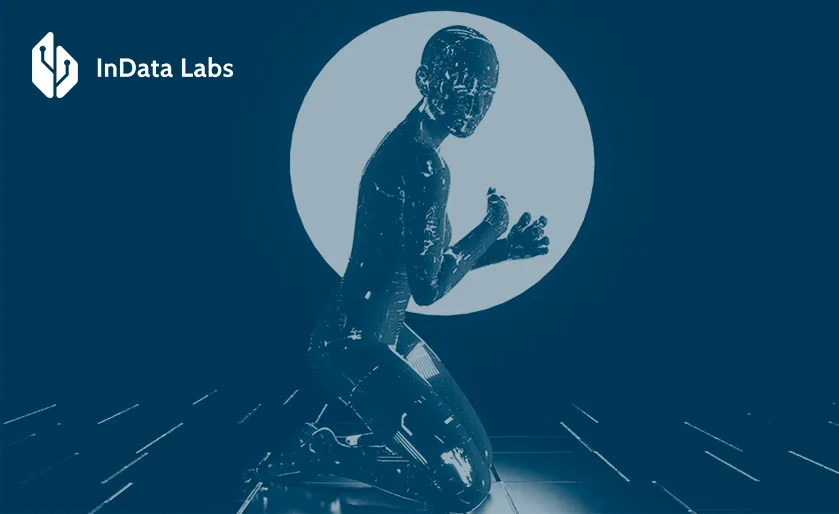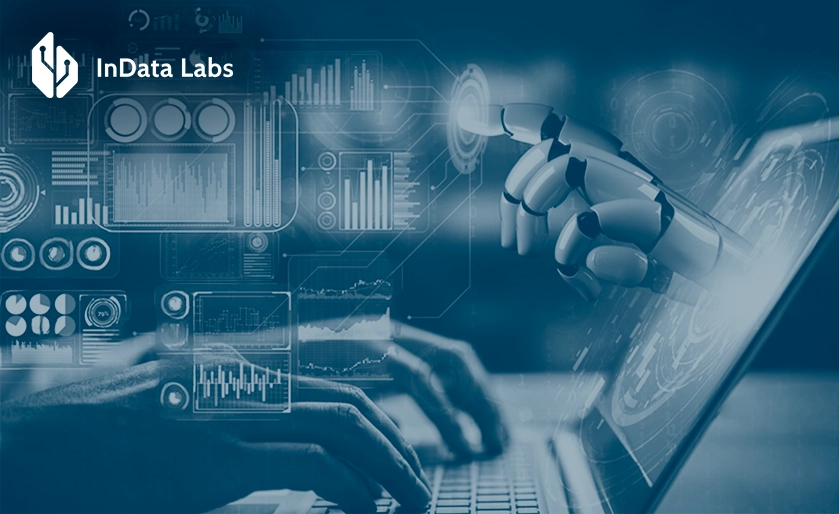For the past few years, the AI agents market has impressed various industries with its rapid growth. Statistics say that by 2027, 82% of large businesses plan to apply AI agents to their workflow. But why have they become the driving force among all the many technologies?
Read this article and learn how AI agents transform the modern market for the better and why every successful company should start utilizing them.
What are AI agents?
AI agents are a type of artificial intelligence system that can accomplish goals and tasks without human interference. Relying on natural language processing and machine learning, they can handle a wide range of tasks, from answering simple questions to finding solutions to complex problems or even multitasking. Their biggest advantage compared to traditional AI systems is that they can improve their work through self-learning and without human input.

Source: Unsplash
But if AI agents can answer questions, then how are they better than AI chatbots, and what is the difference between these two tools? The use of ChatGPT is great when it comes to generating images, text, or code.
However, it can’t work by itself and needs human input, while agentic artificial intelligence is more action-oriented. It can utilize GPT integration services to, for example, summarize key points of a discussion or send an email, but its capabilities extend beyond these specific uses. AI agents can also make decisions, carry out workflows from start to finish, coordinate business processes, call APIs, and more.
In simple terms, AI agents are more than just bots. They are autonomous software systems designed to achieve strategic objectives. They are capable of perceiving their environment, autonomously estimating situations, and taking actions without counting on detailed human guidance.
AI agent market statistics: All you need to know
Generative AI development has reached such heights that we have reached a point where the technology is mature enough, and the pressing business demands can no longer be overlooked.
As was mentioned before, recent LLM development has provided machines with the opportunity to comprehend and generate human speech, while orchestration frameworks and cloud services allow developers to integrate intelligence within end-to-end workflows and eventually develop multi-agent AI.
However, the biggest driving force for change remains modifying customer expectations. Now, clients expect customized support, 24/7 availability, and immediate feedback, which is impossible to achieve without AI-powered customer service.

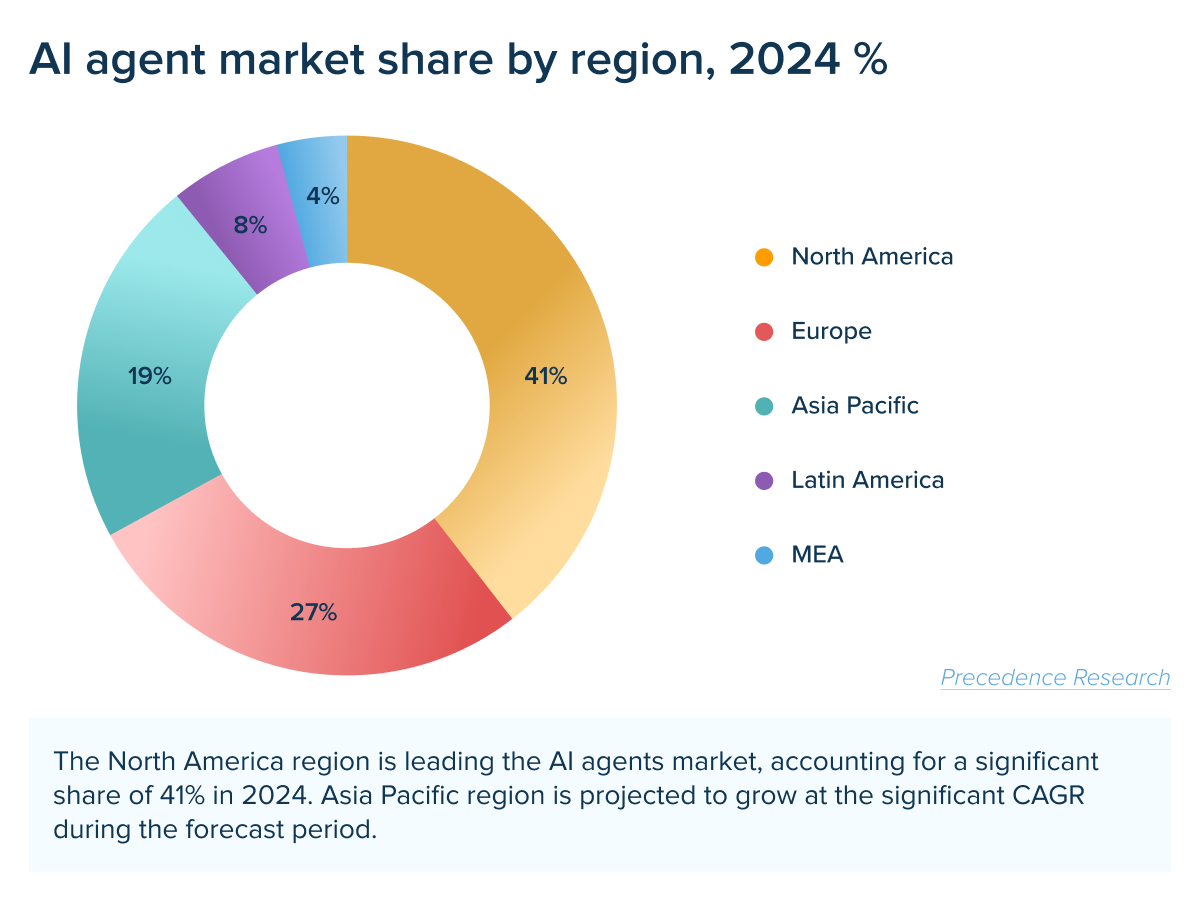
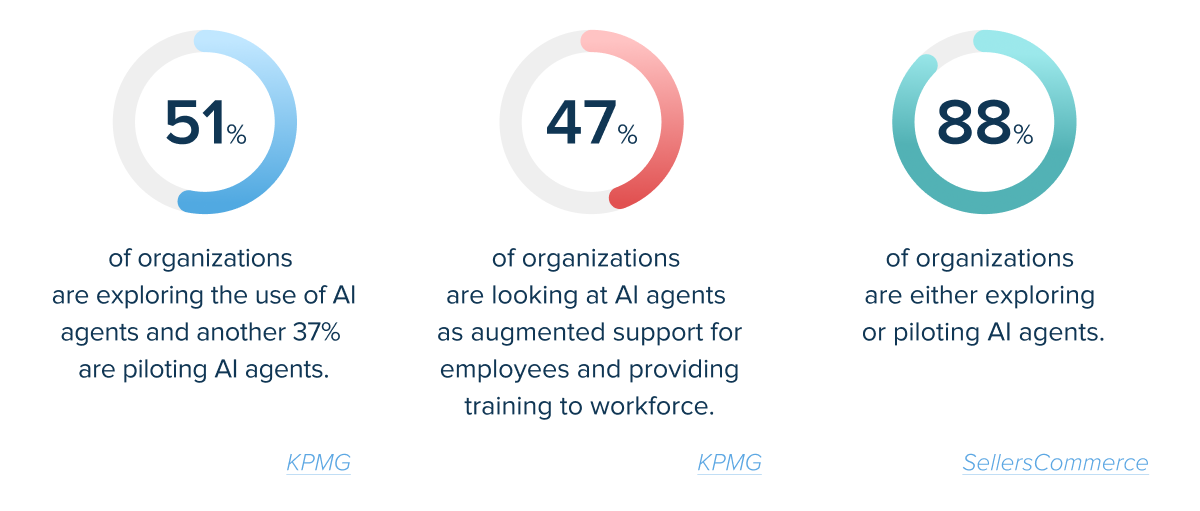
Talking about the inside work of businesses, CEOs have to keep delivering the desired outcomes in spite of workforce shortages, cost-cutting, and rising needs for real-time digital engagement. As a consequence, their teams are flooded with routine work and unable to provide tailored services without significantly increasing staff.
In this case, to stay competitive, businesses need to mitigate internal inefficiency and prevent customer dissatisfaction. Taking a look at AI agent market trends seems the best solution, as they are scalable, dynamic, and able to stay effective without significant human input.
As a result, the AI agents market map is turning broader and involves various industries, from customer service and sales to finance and healthcare. Implementing AI agents nowadays is not just a trend but a necessity to remain successful. The faster you do it, the more benefits you will get.
How are AI agents used today?
Due to LLM development, which is the core decision-making unit of modern agents, they can be trained on a wide array of human knowledge and eventually imitate human processes to find solutions to complex problems as real people do.
Just like LLMs, agentic artificial intelligence performs well when complex problems are broken down into component parts. It requires precise tasks and meaningful context to perform efficiently. Its functionality improves further when interactive feedback mechanisms allow for timely error correction and refinement.
Here are three main areas where multi-agent AI brings business value:
- Automation of standard business processes: AI agents can manage repetitive tasks smoothly and accurately, which can mitigate the risk of human errors and provide team members with more time to concentrate on strategic tasks.

Source: Unsplash
- Cooperation with humans: AI agents are effective, intelligent collaborators that can help employees to make more elaborate decisions, provide actionable insights, and handle tasks to advance human expertise. They are also very efficient in communicating with customers. By working with them even in times when human shifts end, they considerably boost customer experience.
- Uncovering data insights: In settings overflowing with data, AI agents process and integrate vast amounts of information far beyond human capability, uncovering trends and producing insights that inform strategic choices.
Top industries implementing AI agents most in 2025
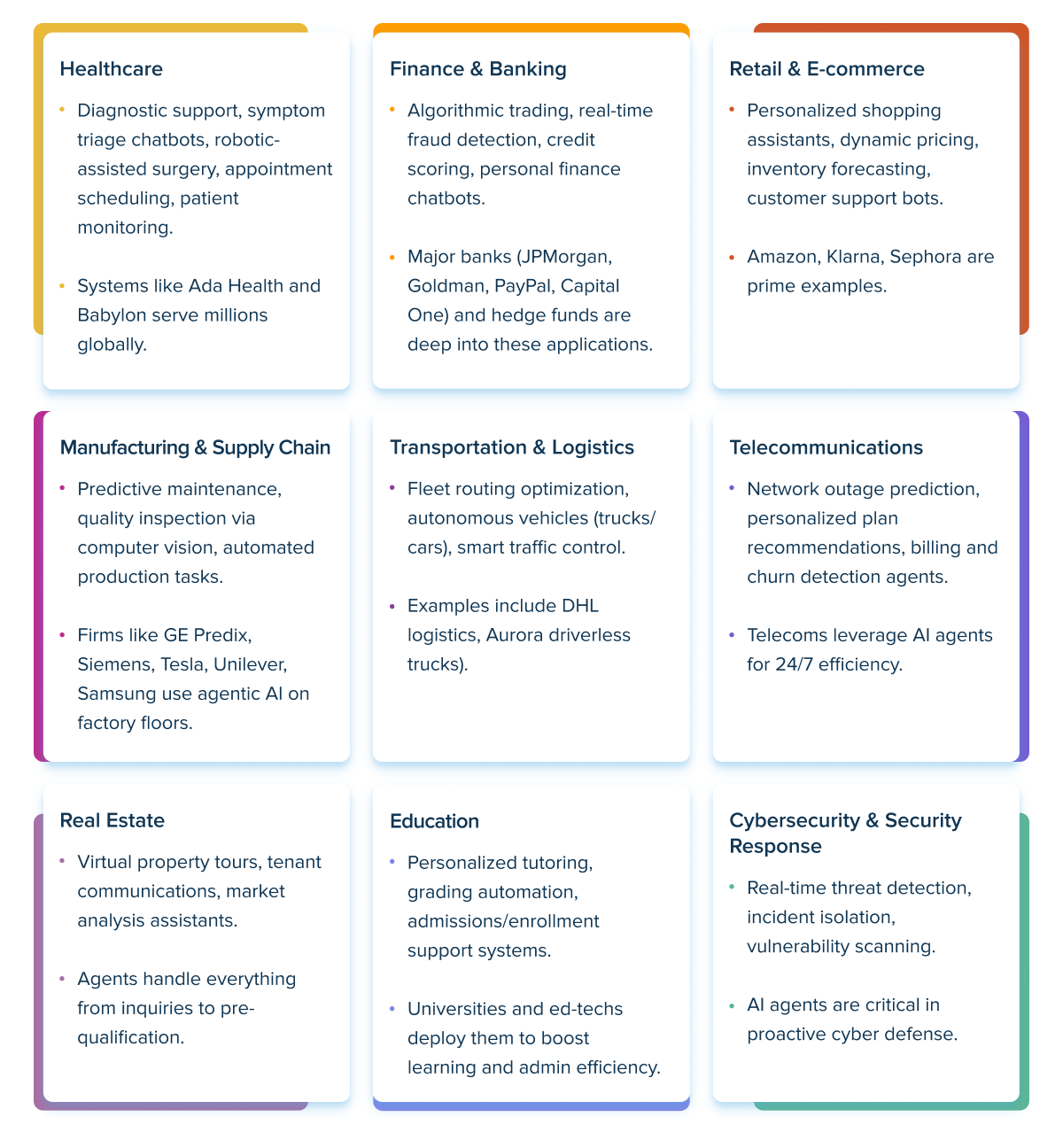
How can AI agents benefit your business?
Here are some bright examples of how turning to the AI agent market can make your business better:
Extensively advanced efficiency and productivity
By automating repetitive tasks, agents allow specialists to prioritize efforts to core business functions. With the removal of routine tasks and workflow optimization, companies can achieve greater effectiveness while saving both valuable resources and time.
Advanced customer experience and support
Utilizing generative AI consulting can lead to impressive results in advanced customer satisfaction and loyalty, as AI agents provide 24/7 client support, respond to questions without delay, and effectively handle customer communications and customize them to meet individual needs.
Enhanced agility and scalability
AI agents provide businesses with the opportunity to manage increasing task volumes without hiring extra specialists while offering boosted operational flexibility and quick response to rapidly changing market demands.
Considerable cost reduction
AI agents improve resource use, streamline repetitive processes, and enhance accuracy to eliminate costly rework, which leads to not only reduced costs but also shortened delivery time, accelerated workflows, and boosted overall efficiency.
Improved revenue growth and sales
AI agents boost revenue by automating the process of attracting and qualifying prospects, executing tailored marketing strategies, simplifying sales operations, and uncovering opportunities for market growth.
Optimized data-driven decision making
By gathering and analyzing extensive amounts of data, following trends, delivering insights, and suggesting valuable recommendations, AI agents allow organizations to drive smarter long-term decision-making. To learn more about AI agents’ decision making, watch this video.
Challenges of adopting AI agents
Despite the AI agent market landscape impressing with its size and benefits, several challenges should be carefully considered before adding this novelty to your business:
Data quality and availability
To perform efficiently, AI agents have to rely strongly on data. That is why businesses need to provide precise, varied, and large datasets. The difficulty comes with obtaining datasets on the highest level, as incomplete or poor-quality data can make ineffective AI agents that provide incomplete recommendations, wrong answers, or user dissatisfaction.
To prevent it, companies should gather only relevant, accurate, and diverse data. If your agent will have to communicate with clients, pay attention to the diversity of scenarios to perform. Also, don’t forget about data privacy regulations such as GDPR while collecting data.
Integration with current systems
When integrating AI agents with tools, datasets, legacy systems, and preexisting software, businesses usually face various obstacles. To achieve seamless integration is no easy task, and AI agents should be trained to cooperate with the existing systems without causing trouble.

Source: Unsplash
Before starting your work with the AI agents marketplace, elaborate a well-planned integration strategy. Think out how your agent will collaborate with existing data sources and systems.
To provide smooth integration with legacy systems, invest in middleware or APIs. If your project includes work with cloud systems, take a look at AI agent platforms that are built for modern cloud environments. Also, don’t forget to make your agent flexible so it could adapt to a new tech stack.
Cost and resource restrictions
Agentic AI development requires loads of resources, such as expert specialists, strong computer resources, high-quality data, and time. Depending on the difficulty of implementation, the price may range from $300,000 to over $1 million. For small businesses or startups, it can be a real obstacle to implementing this technology.
To cut off prices, take a look at pre-built AI tools and platforms that are customizable and more affordable. You can also choose a phased development approach and begin with a simplified version of your AI agent and progressively include features as your business develops.
Constant learning and maintenance
AI agents require continuous maintenance and upgrades to keep on performing well as technology develops. Also, they should always learn from new data to increase precision and adjust to changeable user demands.
Continuously update your system with new data and retrain models so they could maintain their accuracy and relevance. This way, you will create a constant learning pipeline for your AI agent. Automated monitoring systems can help to analyze an agent’s performance and suggest where improvement is necessary. Users feedback can also be helpful in identifying areas for updates.
Does your business need to implement AI agents?
A multi-agent AI solution sounds very promising for a company’s success, but in reality, not every business needs it. The market is full of technologies that can make your project better.
For example, in some cases, AI chatbot development will be a more effective solution. Nevertheless, here are some signs that your business needs to explore the AI agents market research:
Overwhelmed customer support team
Customer feedback analytics is a complicated process that requires the most experienced specialists and a considerable amount of time.
But what happens when the customer support team needs to not only check feedback but also constantly communicate with clients? Even the most professional team may be overwhelmed with such an amount of work. As a result, it may turn into high ticket volumes, long response times, and customer dissatisfaction with service delays.

Source: Unsplash
In times when customers expect a quick solution to their problems, such difficulties may harm a company’s reputation. The best solution will be applying AI agents that can be trained to answer frequently asked questions and do routine tasks, freeing up your staff to concentrate on higher-priority tasks.
Shortage of data-driven insights
In today’s highly competitive market, data is the most valuable resource any company may have to stay at the top level.
Nevertheless, many companies still prefer relying on old-fashioned methods of decision-making or simple gut feelings. Such businesses have difficulties in handling vast amounts of data they collect, which leads to uninformed decisions and missed opportunities.
AI agents can process large amounts of data to provide predictions and insights. As a result, businesses can make data-driven choices that foster growth. By transforming data into strategic intelligence, they help businesses to have a clear view of market trends, customer actions, and performance.
Difficulty scaling operations
Your teams do their job well, and your project has great outcomes, but your systems can’t handle the rising demand, and, as a result, your business faces growth challenges. As your operations scale, your current systems may have performance limitations that lead to overlooked chances, delays, and loss of customer trust.

Source: Unsplash
By using AI agents, you can scale your business while maintaining operational effectiveness throughout expansion. Without the need to enlarge your team, they can scale your business functions, such as inventory control, order processing, and customer support.
Hardships in staying competitive
According to the research, 42% of companies that have applied AI to their business noticed remarkable growth and competitive advantages. This means that companies that still neglect the importance of artificial intelligence in modern business are at risk of falling behind.
As AI agents are the new word in artificial intelligence development, they can give you a significant competitive edge. They can easily help you to level the playing field with your competitors or even outpace them by having data-driven insights and automation of your work.
Repetitive tasks and ineffective workflows
Routine operations such as scheduling and data entry may take up too much time for employees. Manual processes are resource-demanding and error-prone, but still many businesses rely on them. As a consequence, teams spend extra time on repetitive tasks like document management, data input, and scheduling communications. This process not only reduces efficiency but also enhances the risk of mistakes.
AI agents can reduce the risk of mistakes and improve efficiency by automating these processes. This way businesses can devote more time to concentrating on higher-level strategic work.
AI agent market forecast: What’s ahead
According to recent research, in 2024, the AI agent market size was estimated at USD 5.4 billion and is predicted to reach USD 50.31 billion by 2030 with a growing CAGR of 45.8% from 2025 to 2030. It means that this industry has a very promising future, but how will it work?
As AI agents have become a usual thing in business, humans need to adjust to working with them as teammates. Similarly to human employees, they will be involved in organizations workflows to do the same work—access important business data, be trained to comprehend their roles, support humans’ duties, and integrate into workflows.
Sophisticated disciplines that earlier needed large numbers of experts, such as customer service, software development, and business analytics, will change for a small number of people who will work with different types of AI agents. As agents can replicate fast, businesses will scale quicker without the need to hire to grow.
By using AI agents, companies can find innovative business strategies and advance operational efficiency. Developers will get more opportunities to be creative, as routine tasks will be done by agents. They also will be more productive, as artificial intelligence agents will streamline workflows that need considerable manual effort and time.
Some employees may be afraid of losing their job because of AI agents, but it’s not true. In the future, there will be loads of specialists that can supervise agents so they could reach their goals and ensure the compliance of fairness, privacy, and ethical use. AI agents are getting more sophisticated, and, due to this, the need for good experts that can manage them is also rapidly rising. That is why companies should train their teams on how to work with AI agents.
The AI agent market landscape has already impressed with its size and effectiveness, and it doesn’t plan to stop—it will only get better. Nowadays, applying an AI agent is not just a trend; it’s a novelty any company that wants to be successful should get. By automating repetitive tasks and delivering data-driven insights that help make informed decisions, companies can focus on more complicated tasks and be more creative, which helps them to achieve the level that previously seemed unreachable. The future of artificial intelligence definitely lies in this system.
FAQ
-
Nowadays, the AI agent market share is facing rapid growth. In 2024 it was estimated at USD 5.4 billion and is anticipated to grow to USD 50.31 billion by 2030.
-
There are four rules developers use to make AI agents’ work effective and intelligent. Here they are:
- Perceive the environment
- Take action based on the decision
- Use observations to make decisions
- Ensure rationality of actions.
-
According to the report made by Campus Technology, 85% of companies utilize AI agents to optimize workflows, boost productivity, and advance customer satisfaction.
-
Based on their level of intelligence and decision-making capability, all AI agents are divided into five types. Here they are:
- Goal-based agents
- Simple reflex agents
- Learning agents
- Model-based reflex agents
- Utility-based agents.
-
Of course, you can, but building an AI agent is a very sophisticated process, and without proper expertise, it may take more time and cost. It will be more effective to contact experienced specialists from InData Labs who will help you to fulfill all your needs and free you from extra efforts.
